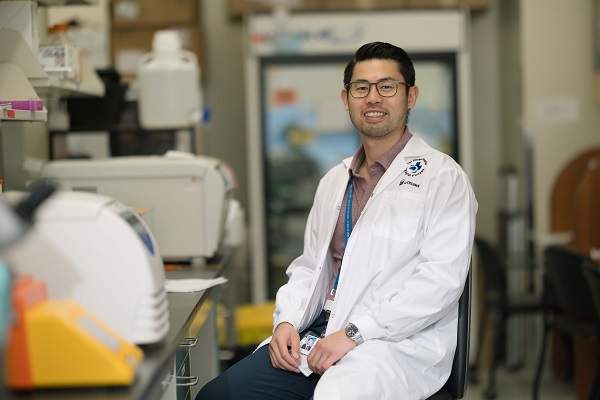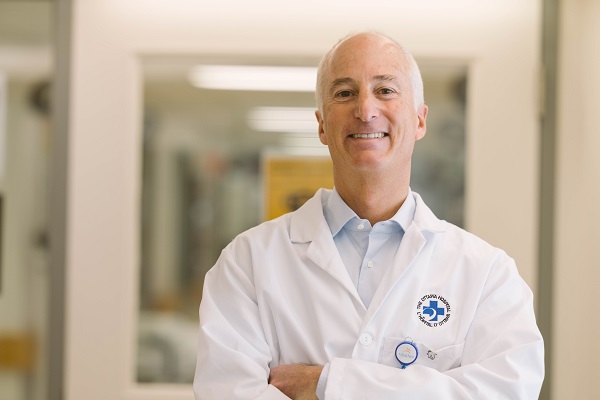Each year, The Ottawa Hospital and its Research Institute honour a small number of outstanding researchers for discoveries and innovations that are improving patient care at TOH and advancing science around the world. This year’s honourees have led game-changing discoveries and clinical trials in areas such as lung disease, cancer, palliative care, and regenerative medicine.
Meet them here:
Powering up the body’s EVs
 Dr. Alvin Tieu knows his EVs – not electric vehicles, but extracellular vesicles. Under the joint supervision of Dr. Manoj Lalu and Dr. Duncan Stewart, Dr. Tieu investigated whether these tiny particles released by mesenchymal stem cells could be used to treat serious lung diseases. By systematically looking at previously published lab experiments, he found that stem cell EVs improved outcomes in animal models of acute lung injury, bronchopulmonary dysplasia, and pulmonary arterial hypertension. He also identified significant knowledge gaps in EV research, and designed lab experiments to help fill those gaps. When this lab work was interrupted by the COVID-19 pandemic, Dr. Tieu decided to use his experience with animal models of lung disease to create a new mouse model of severe COVID-19. For his multidisciplinary research on life-threatening lung diseases, Dr. Alvin Tieu is receiving the Worton Researcher in Training Award. Learn more about Dr. Tieu in this story and Q&A.
Dr. Alvin Tieu knows his EVs – not electric vehicles, but extracellular vesicles. Under the joint supervision of Dr. Manoj Lalu and Dr. Duncan Stewart, Dr. Tieu investigated whether these tiny particles released by mesenchymal stem cells could be used to treat serious lung diseases. By systematically looking at previously published lab experiments, he found that stem cell EVs improved outcomes in animal models of acute lung injury, bronchopulmonary dysplasia, and pulmonary arterial hypertension. He also identified significant knowledge gaps in EV research, and designed lab experiments to help fill those gaps. When this lab work was interrupted by the COVID-19 pandemic, Dr. Tieu decided to use his experience with animal models of lung disease to create a new mouse model of severe COVID-19. For his multidisciplinary research on life-threatening lung diseases, Dr. Alvin Tieu is receiving the Worton Researcher in Training Award. Learn more about Dr. Tieu in this story and Q&A.
The quest for a good death
 Dr. Colleen Webber isn’t afraid to talk about death. As a palliative care researcher in Dr. Peter Tanuseputro’s group, this senior clinical research associate and postdoctoral fellow does it every day. By studying how palliative care is delivered in hospitals she established new research methods that have been adopted by researchers across Ontario. She’s now leading a project on the impact of social isolation on long-term care residents during the COVID-19 pandemic. So far, her team has found long-term care residents in Ontario did not suffer steeper cognitive declines due to COVID-19-related isolation. She’s also leading a second project about palliative care delivery for people with schizophrenia, and whether it differs from the care received by people without schizophrenia. The research is still in its early stages, but the team has found that people with schizophrenia are more likely to be in living in long-term care before they die. They’ll also be asking whether palliative care and other health services could be better structured to meet the needs of this population. Dr. Webber is receiving the Clinical and Applied Health Researcher in Training Award for her rigorous and empathetic palliative care research. Learn more about Dr. Webber in this story and Q&A.
Dr. Colleen Webber isn’t afraid to talk about death. As a palliative care researcher in Dr. Peter Tanuseputro’s group, this senior clinical research associate and postdoctoral fellow does it every day. By studying how palliative care is delivered in hospitals she established new research methods that have been adopted by researchers across Ontario. She’s now leading a project on the impact of social isolation on long-term care residents during the COVID-19 pandemic. So far, her team has found long-term care residents in Ontario did not suffer steeper cognitive declines due to COVID-19-related isolation. She’s also leading a second project about palliative care delivery for people with schizophrenia, and whether it differs from the care received by people without schizophrenia. The research is still in its early stages, but the team has found that people with schizophrenia are more likely to be in living in long-term care before they die. They’ll also be asking whether palliative care and other health services could be better structured to meet the needs of this population. Dr. Webber is receiving the Clinical and Applied Health Researcher in Training Award for her rigorous and empathetic palliative care research. Learn more about Dr. Webber in this story and Q&A.
Catching cancer at its sneakiest moment
 As a surgical oncologist and laboratory scientist, Dr. Rebecca Auer has the unique ability to remove patients’ tumours, study them in the lab, develop new treatments and test them in clinical trials. And that’s exactly what she’s done, resulting in six innovative clinical trials over the last decade. Along the way, Dr. Auer and her team have made major progress in understanding how surgery stresses the body and weakens the immune system. They have also discovered how cancer cells that remain after surgery can sneakily take advantage of the body’s weakened immune system and begin forming a new tumour. Dr. Auer’s research aims to find therapies to boost the immune system and prevent cancer from coming back after surgery. One of the first avenues she explored was the ability of cancer cells to hide from the immune system by coating themselves in fragments of blood clots. This resulted in a cross-Canada clinical trial, published in The BMJ, that changed practice in an unexpected way. Learn more about Dr. Auer and why she is receiving the Chrétien Researcher of the Year Award in this story and Q&A.
As a surgical oncologist and laboratory scientist, Dr. Rebecca Auer has the unique ability to remove patients’ tumours, study them in the lab, develop new treatments and test them in clinical trials. And that’s exactly what she’s done, resulting in six innovative clinical trials over the last decade. Along the way, Dr. Auer and her team have made major progress in understanding how surgery stresses the body and weakens the immune system. They have also discovered how cancer cells that remain after surgery can sneakily take advantage of the body’s weakened immune system and begin forming a new tumour. Dr. Auer’s research aims to find therapies to boost the immune system and prevent cancer from coming back after surgery. One of the first avenues she explored was the ability of cancer cells to hide from the immune system by coating themselves in fragments of blood clots. This resulted in a cross-Canada clinical trial, published in The BMJ, that changed practice in an unexpected way. Learn more about Dr. Auer and why she is receiving the Chrétien Researcher of the Year Award in this story and Q&A.
“Super-collaborator” helps patients breathe easier
 It’s no exaggeration to say that Dr. Shawn Aaron’s research has transformed the diagnosis and care of chronic obstructive pulmonary disease (COPD), asthma and cystic fibrosis. And he’s not done yet. During his research training, Dr. Aaron led a clinical trial that showed patients with COPD flare-ups treated with the steroid prednisone had fewer relapses in the next month. Now Dr. Aaron is focused on catching patients with COPD early, with the hopes of improving their outcomes. The challenge with COPD is most people don’t know they have it—an estimated 70% of cases go undiagnosed. Dr. Aaron led the first-ever randomized controlled trial to systematically seek out and treat people with undiagnosed COPD as well as asthma, which has similar symptoms. Patients in the trial diagnosed with early COPD or asthma received either intensive treatment or usual care, to see if the intensive strategy can improve their outcomes. Results are expected in 2024. Dr. Aaron is a founding director of the Canadian Respiratory Research Network, which has provided a strong vision for respiratory disease research in Canada. He is receiving the Grimes Career Achievement Award for practice-changing research in COPD and other chronic lung diseases. Learn more about Dr. Aaron in this story and Q&A.
It’s no exaggeration to say that Dr. Shawn Aaron’s research has transformed the diagnosis and care of chronic obstructive pulmonary disease (COPD), asthma and cystic fibrosis. And he’s not done yet. During his research training, Dr. Aaron led a clinical trial that showed patients with COPD flare-ups treated with the steroid prednisone had fewer relapses in the next month. Now Dr. Aaron is focused on catching patients with COPD early, with the hopes of improving their outcomes. The challenge with COPD is most people don’t know they have it—an estimated 70% of cases go undiagnosed. Dr. Aaron led the first-ever randomized controlled trial to systematically seek out and treat people with undiagnosed COPD as well as asthma, which has similar symptoms. Patients in the trial diagnosed with early COPD or asthma received either intensive treatment or usual care, to see if the intensive strategy can improve their outcomes. Results are expected in 2024. Dr. Aaron is a founding director of the Canadian Respiratory Research Network, which has provided a strong vision for respiratory disease research in Canada. He is receiving the Grimes Career Achievement Award for practice-changing research in COPD and other chronic lung diseases. Learn more about Dr. Aaron in this story and Q&A.
The Ottawa Hospital is a leading academic health, research and learning hospital proudly affiliated with the University of Ottawa and supported by The Ottawa Hospital Foundation.
